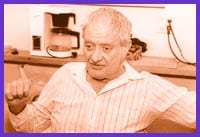The first person to admit defeat in the Supreme Court Of Canada’s child pornography judgment is the man who sparked it.
“It’s more like the court decided to strike down parts of the Charter Of Rights rather than the law,” says Vancouver resident John Robin Sharpe, blunt in his criticism of the Jan 26 decision. “The evidence before them was extremely lopsided. The Crown had expert witnesses: [Paedophilia expert Dr Peter] Collins gave his theory of the harm of child pornography, a very questionable one, and the Supreme Court decided to chisel it in legal granite. I mean, it’s junk science.”
The “junk science” is the theory that child pornography is used as a grooming tool by paedophiles, and that the pictures and words will make them act on their urges.
Sharpe says monkey see does not mean monkey do.
But the harm of child pornography was affirmed by the judges in their decision. And for that, Sharpe blames his lawyers. Sharpe says the team of attorneys conceded the harm argument, over his objections.
Sharpe was first charged in April 1995 – when Canada Customs officials seized computer disks and manuscripts. Two more charges were added in May when police raided his apartment.
Almost four years later, Justice Duncan Shaw of the Supreme Court Of British Columbia dismissed two charges of possession of child pornography. Shaw accepted that the harm argument was flawed and that child pornography might have cathartic effects.
“I feel betrayed by them,” says Sharpe of his lawyers. “I feel when they decided they could not support the original ruling by Judge Shaw, that they could not support my acquittal, they should have dropped my case.”
The court carved out two defences from the existing law: It is okay to possess written materials made by and for the accused alone – but while you can write about sex with a child in your diary, you can’t show it to anyone else. That’s distribution, and it’s illegal.
Visuals depicting the accused doing an otherwise legal act is also okay – but if you’re a 14-year-old, you can’t show a picture of your penis to a guy you slept with yesterday. That too, is illegal.
“The court, in effect, amended the sections of the [Criminal] Code, wrote in two significant exceptions and cast a very broad net over artistic merit,” says Sharpe’s lawyer Richard Peck.
But none of that will save Sharpe. He’ll be back in court Wed, Feb 20, and will likely defend himself.
The Crown will now proceed on the original possession charges and on two more charges of intending to distribute child pornography. Some of the seized materials shown in court previously include portraits of (real) naked teenaged boys, smiling into the camera. They don’t fit under either of the new exemptions.
(The law still catches anyone under 18 but older than 14 – although the age of consent in Canada is 14, and sex with a 14-year-old is perfectly legal unless you’re in a position of authority over them – like a coach or teacher.)
In accepting the harm evidence the Supreme Court Of Canada justices relied on an established legal standard of “reasonable apprehension” of harm. That means that some evidence of possible harm is enough to make its expression illegal.
Peck says he had to be selective over which arguments to push before the court, and decided to focus on parts of the law that went too far. Peck says the standard of scientific proof in cases involving children is automatically set low.
“If there was evidence that this stuff was potentially harmful, and some evidence that it had a cathartic effect, the fact that you’re dealing with children the court would say, ‘if there’s some evidence that it’s harmful, that’s good enough for us,'” says Peck. “That’s certainly what they did.”
Peck is focussing on the positive, and doesn’t see why Sharpe is so disappointed.
The verdict from the British Columbia Civil Liberties Association – which intervened on Sharpe’s side – is “not bad.”
Association vice-president John Dixon says the court carved out the most “obnoxious” parts of the law, but problems remain. Videos or photos showing actual children should be the only materials made illegal, says Dixon.
“My guess is, within a calendar year we’ll be seeing examples of those problems in court.”
Police – including Toronto’s Julian Fantino – applauded the small scope of the ruling. More than 40 kiddie porn cases on hold in Ontario will now go ahead. Fantino ran a so-called kiddie porn investigation in London, Ontario called project Guardian that targeted gay men paying for sex with teenaged hustlers.

 Why you can trust Xtra
Why you can trust Xtra


